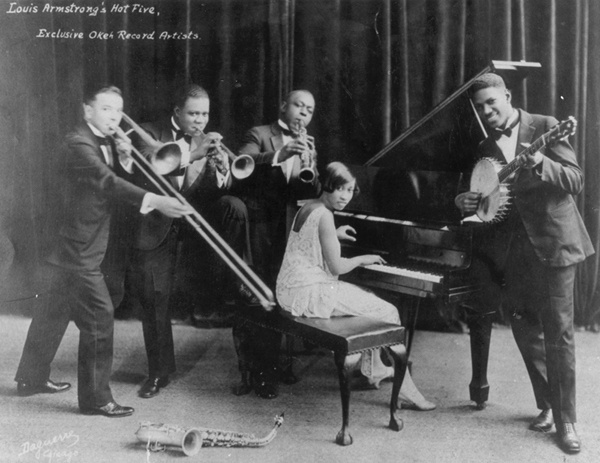Jazz Commentary: Louis Armstrong as Negotiator
By Steve Provizer
Throughout much of his career, Louis Armstrong negotiated a balance between being a “popular” artist and a jazz artist.

Louis Armstrong and His Hot Five.
Michael Ullman’s review of Ricky Riccardi’s book Heart Full of Rhythm: The Big Band Years of Louis Armstrong left me thinking about the musician’s relationship with the “jazz audience” and “the general public,” which I see as a variation on the conflict between “commercialism” versus “art.” I haven’t read the book, so can’t speak to how Riccardi handles the question, but it’s easy to see why Armstrong’s place in this duality has long been ambiguous and hard to decode.
In the ’20s, Armstrong created the kind of creative vortex that anyone aspiring to play jazz had to reckon with. This impact was largely due to the trumpeter’s Hot Five and Seven recordings and his work with pianist Earl Hines, which was both a summation and a looking forward. They were technical and creative landmarks. But by the late ’20s, Armstrong’s career began to shift. At this point he was being promoted and recorded pretty much equally, as both a vocalist and trumpet player. For the rest of his life, he negotiated this balance between being a “popular” artist and a jazz artist.
Part of this negotiation entailed codifying — fine tuning — his solos. In jazz, codification was far more widespread than people acknowledge. The rise of bebop initiated a new priority among musicians — improvisation above all else. Codification began to be seen as being a debasement, a dependence on the tried-and-true. This was part of the “war” of the ’40s that broke out between champions of bop and of traditional jazz (nicknamed “moldy figs”), during which Armstrong famously called bop “Chinese music.” No matter which side you take in that fracas, Armstrong’s position was a manifestation of his ongoing negotiation of the entertainer/jazz musician duality.
To the cohort growing up from the ’60s on, Armstrong was known as a popular entertainer, whose style of playing and stagecraft were, to put it in neutral terms, “old-school.” Armstrong’s playing was rooted in Traditional and Early Swing Jazz and his hits Hello Dolly, Cabaret, and What A Wonderful World were not going to get the blood pumping in a young jazz fan.
In time, I and probably most of that younger generation of jazz fans looked back and discovered the revolutionary ’20s Armstrong recordings. Naturally, that caused a reevaluation of his role in the music and has affected the way he was seen. What might have been perceived as “Uncle Tomming” or stage behavior potentially embarrassing from a racial standpoint was reassessed, eventually subsumed under a larger, longer view of Armstrong’s contribution. Learning of his sometimes ferociously expressed views on racial equality reinforced that reevaluation. I wouldn’t be surprised if this cycle of critique — patronization followed by rediscovery — is one that subsequent generations of jazz fans will go through.
The jazz audience and the general audience each listen for different things. Armstrong is one of the few musicians gifted with a constellation of performance skills — and musical creativity capable of satisfying listenerships across the board. But every musician has to resolve his or her relationship to this thorny question. When tradition and familiarity dominate, an art form can become brittle, losing its flexibility, its ability to respond to fresh ideas. If “newness” and innovation become the sole motivators, invaluable historical ballast is lost. Knowing that this struggle has long bedeviled the music can help young musicians see their own battles as part of a continuum. If the music of past jazz masters provides inspiration to aspirants, so does knowing they faced many of the same problems. This is a continuum that is not just musical but very human.
Steve Provizer writes on a range of subjects, most often the arts. He is a musician and blogs about jazz here.

Steve: any comment on Louis is welcome–because it starts the conversation!–After this start any one who delves into Louis’ life will come to the best conclusion of his value to music’s growth. When I first heard “West End Blues” (which I came to late in my music career) I was completely knocked out.
Thanks for your article.
Red Beans and Ricely yours, John Crocken